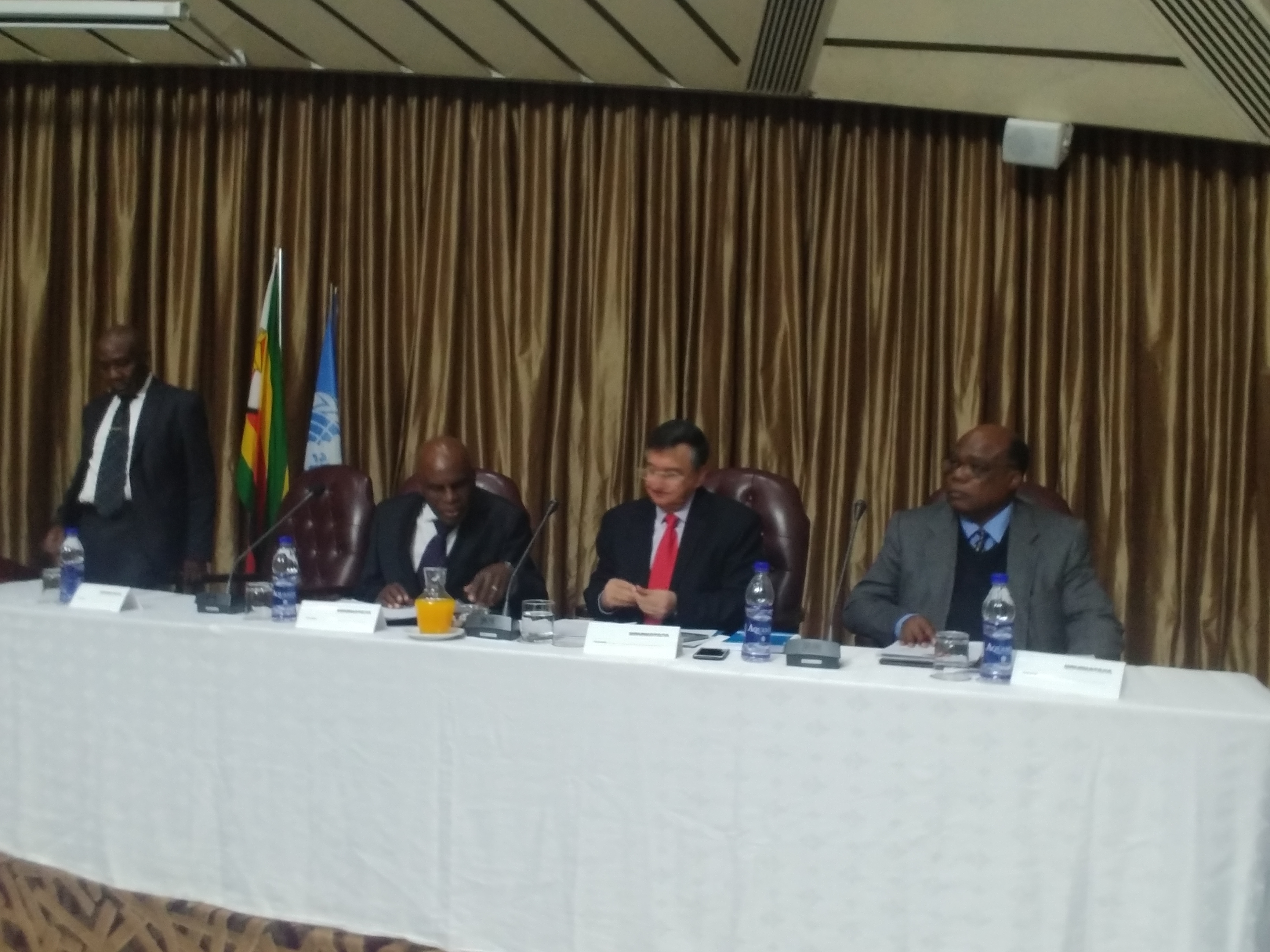By Byron Mutingwende
The Zimbabwe United Nations Development Assistance Framework (ZUNDAF) has recorded significant progress regardless of the current economic challenges, which have been exacerbated by climate change effects, Dr. Misheck Sibanda, the Chief Secretary to the President and Cabinet has said.
In a speech read on his behalf at the High Level ZUNDAF Annual Review and 2019 Beyond Strategic Planning meeting held on Thursday 1 August 2019 at the Monomotapa Hotel in Harare, Dr. Sibanda said the progress registered is towards sustainable development, which is about leaving no one behind, and also increasing the prospects of every child that is born to have a brighter future: creating a conducive environment for the people to achieve their aspirations; as well as ensuring equal access to justice and human rights for all.
He commended the fact that during the implementation of the 2016-2020 ZUNDAF, the United Nations Country Team officially adopted the ‘Delivering As One Approach’ to further enhance the efficacy of the United Nations and avoid duplications as well as the gaps in programming.
“The implementation of the ZUNDAF has remained on track with assistance delivered to the most vulnerable populations, Cyclone Idai, cholera and other humanitarian causes. The support has also resulted in inter-alia sustained and expanded quality social services, stepped-up gender equality and scaled-up HIV and AIDS response; strengthened resilience, disaster risk management, and enhanced democratic governance,” Dr. Sibanda said.
The Chief Secretary said the Government increased the budget allocations to the social services sector, particularly health, educations and social protection. He emphasised that inclusive growth and achievement of the SDGs require the cooperation of the UN and development partners, and more importantly the private sector, both domestic and foreign investment, to invest and believe in Zimbabwe’s future.
The United Nations Resident Coordinator, Mr Bishow Parajuli said the UN development system reform regards ZUNDAF as the centrepiece of its reform process.
“ZUNDAF is UN Zimbabwe’s most important planning and implementation instrument, a collective offer of support to Zimbabwe in accelerating progress towards the SDGs.
“ZUNDAF is a partnership framework between the Government of Zimbabwe and the UN. ZUNDAF is led and owned by the Government. Following the launch of the Transitional Stabilisation Programme last October, and the Government’s intention to prepare a five-year national development plan 2021-2025, the Government and the UN jointly decided to extend the current ZUNDAF by one year, until 2021. This would allow for the new UN strategic framework to be fully aligned in substance to the new national development priorities as articulated in the new national development plan,” Mr Parajuli said.
For the remainder of the ZUNDAF period, he said, the UN will re-prioritise its joint efforts to better support the Government to deliver the priority economic, social and governance reforms as articulated in the Transitional Stabilisation Programme (TSP).
Mr. Parajuli said the ZUNDAF has been delivering over USD 400 million annually through various development projects and programmes, in support of the Government’s efforts. He said the UN’s integrated support spans from: Food and Nutrition Security; Gender Equality; HIV & AIDS; Poverty Reduction and Value Addition; Public Administration and Governance; and, Social Services and Protection.
The UN – in support of the Zimbabwe Electoral Commission (ZEC) – provided technical assistance to the establishment of a biometric voter registration (BVR) system, registering over 5.7 million voters. With UN and civil society support, ZEC rolled out a voter education campaign reaching over 10 million people, including women. These efforts positively contributed to the record voter turnout of 85%.
As a direct contribution to Zimbabwe’s achievement of the SDGs, including SDG 5 – Gender Equality, the EU and the UN last year developed a comprehensive four-year programme that focuses on the elimination of sexual and gender-based violence and harmful practices. Under the overall leadership of the Government, the programme will be implemented through a broad partnership with civil society, private sector, media and others at the national, subnational and community levels. The Spotlight Initiative will place specific focus on reaching and including women and girls who are often isolated and most vulnerable to GBV due to intersecting forms of discrimination. The programme also will seek to address the sexual and reproductive health needs of all women and girls using a life-cycle approach.
To better cope with climate, economic and other shocks, in 2018, over half a million people were supported through various resilience-building efforts, ranging from crop and livestock activities, development of productive infrastructure, value chain development, access to water and sanitation, trainings and skills transfer, village savings and lending groups, safety nets, and disaster risk management.
“The work of the UN is only possible through the unwavering faith in multilateralism, humanity and universal values. I would like to take this opportunity to thank the strong partnership with the Government and civil society partners, and generous support from the development partners – including the United States of America, United Kingdom, Global Fund, European Union, Germany, Sweden, Japan and many others – many of whom are here today.”
Mr. Parajuli said the country is currently facing a multitude of humanitarian challenges as a result of climate and economic shocks. He noted that the impact of the drought combined with continuing macro-economic challenges have resulted in high-levels of food insecurity. 5.1 million people are estimated to be in urgent need of humanitarian assistance and protection during the prolonged 2019/2020 lean season.
He underscored the fact that the UN support is therefore taking an integrated three-pronged approach that strengthens the humanitarian-development-peace nexus:
- Addressing short-term life-saving humanitarian needs;
- Scaling up resilience-building activities targeting at-risk communities and social protection programmes for the poorest, most vulnerable and disadvantaged, protecting and promoting their human rights; and,
- Longer-term support to socio-economic transformation and poverty reduction, through accelerating reform measures – including anti-corruption efforts – as articulated in the country’s Vision 2030 and the Transitional Stabilisation Programme.
